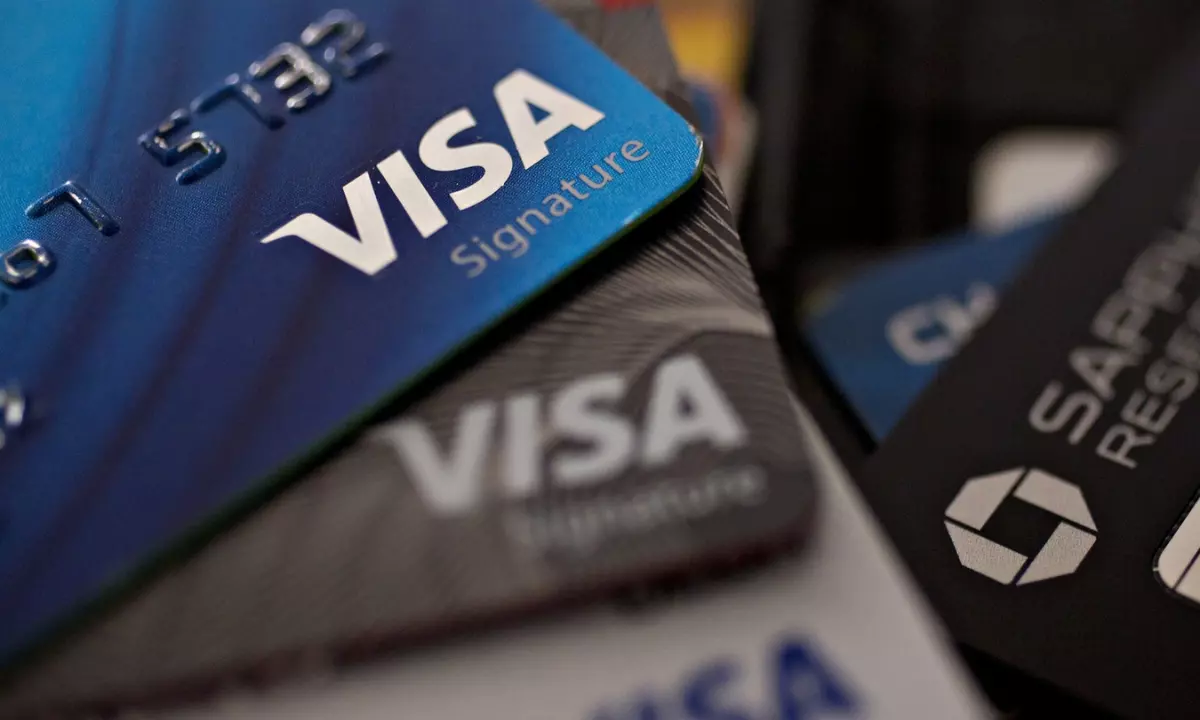
No doubt you’ve seen the Visa logo on a credit or debit card before – but what exactly is a Visa card and how is it different from a Mastercard? Does it matter which one you choose when deciding on a credit card?
In this guide, we’ll take a closer look at Visa, how it compares to Mastercard, and some common credit card terms to help you get started with credit cards.
What is a visa?
Simply put, Visa is a payment network. When you buy something with your Visa card, Visa processes the payment and immediately communicates with your bank and merchant to allow the merchant to pay. This happens whether you’re shopping in person or swiping your card on your laptop, tablet, or phone.
Mastercard, American Express and Discover are also payment networks, but Visa and Mastercard are undoubtedly the most widely used.
What is the history of visas?
Visa’s operations began in 1958, when Bank of America introduced the BankAmericard® credit card. It was the first consumer credit card program and brought great success to the company, allowing it to expand internationally in 1974. In 1976, BankAmericard changed its name to Visa—a name that sounded the same in all languages.
Visa continued to grow as regional companies around the world merged to form Visa, Inc. in 2007. A year later, the company went public in the largest initial public offering (IPO) in history. Today, Visa operates in more than 200 countries and territories and its mission is to be “the best way to pay and get paid for everyone, anytime, anywhere.”
Of course, people who buy credit cards usually prefer widely accepted ones. As Visa dominates the global payments network industry, it attracts new consumers and merchants.
How are payment networks different from card issuers?
Despite Visa’s popularity, there is often confusion about the role the Visa card plays in credit card benefits. For example, American Express and Discover are both payment networks and credit card issuers. However, unlike American Express and Discover, Visa doesn’t issue credit cards; it’s just a payment network.
Instead, financial institutions like banks—such as Chase, Capital One, and Wells Fargo—issue credit cards, and Visa acts as a communication line that allows payment transactions to be processed. Credit card issuers, not payment networks, manage rewards programs and credit card benefits, and set credit terms such as interest rates and fees.
Visa and Mastercard
In practice, Mastercard is almost as widely accepted as Visa. But both payment networks offer credit card members the added benefit of being part of their network, which is where Visa and Mastercard differ. Overall, Visa benefits are more focused on travel and protection, while Mastercard is more focused on discounts and promotions.
Visa benefits
Visa offers three main benefit tiers: Traditional, Signature and Unlimited.
- Traditional Tier: Includes no fraud liability, emergency card replacement and cash payments, comprehensive rental car insurance and roadside assistance.
- Signature Level: Includes all traditional benefits plus 24-hour travel and emergency assistance.
- Unlimited Tier: Includes all benefits of other tiers, plus travel accident, cancellation and curtailment, travel delay compensation, lost baggage insurance (up to $3,000 per trip or $2,000 per bag if you live in New York), round trip protection , and Purchase Protection.
MasterCard Benefits
Mastercard also offers three main tiers of benefits: Standard, World, and World Elite.
Standard Tier: Includes emergency card support and replacement, no fraud liability, and identity theft protection.
World Class: Includes all standard benefits plus travel programs, travel upgrades, concierge services and numerous discounts and promotions. Current promotions include three free months of DoorDash DashPass for new members, a free Shoprunner membership, $5 in Lyft credit if you take at least 3 trips per month, and more.
World Elite Level: Includes all previous benefits plus exclusive offers and more discounts and promotions. The current promotion is the same as the World Promotion, plus exclusive PGA Tour experiences and VIP travel experiences (such as overseas cooking classes, tours or personal shopping services).
Learn about credit card terms
If you’re new to Visa, Mastercard, and credit card issuers, it’s helpful to know some common credit card terms.
- Annual Fee: Credit card issuers, such as banks, may charge customers an annual fee for using the credit card. Payment networks such as Visa and Mastercard cannot determine this fee.
- Annual Interest Rate (APR): This is the total loan fee charged by the lender each year. Visa does not determine APRs or interest rates for any credit card product. Paying your balance in full on time can help you avoid paying interest on your purchases.
- Balance Transfer: Transfer of outstanding receivables from one account to another. Individuals with credit card debt typically use remittance credit cards, which allow them to owe their debt at 0% interest over a period of time, such as a month. B. 12 to 21 months, can be paid off.
- Credit History: Used by lenders to determine whether to approve a credit card application. It shows how the applicant has processed the loan in the past, including the amount owed, the amount of the line of credit and whether it was paid on time.
- Credit rating: Usually expressed as a score, it represents a person’s ability to repay financial obligations based on their income and credit history. Three credit reporting agencies—TransUnion, Experian, and Equifax—provide credit ratings and credit scores in the United States.
Final result
Without a doubt, Visa is one of the largest and most recognized payment networks in the world, and if global acceptance is important to you, Visa is a safe network. But keep in mind that Visa doesn’t manage rewards programs, determine interest rates, or set credit card fees—the credit card issuers take care of those things. When choosing a credit card, it’s important to consider these aspects of what the card issuer offers — not just broad credit card acceptance — to ensure you’re getting a card that meets your needs.
Learn more:
